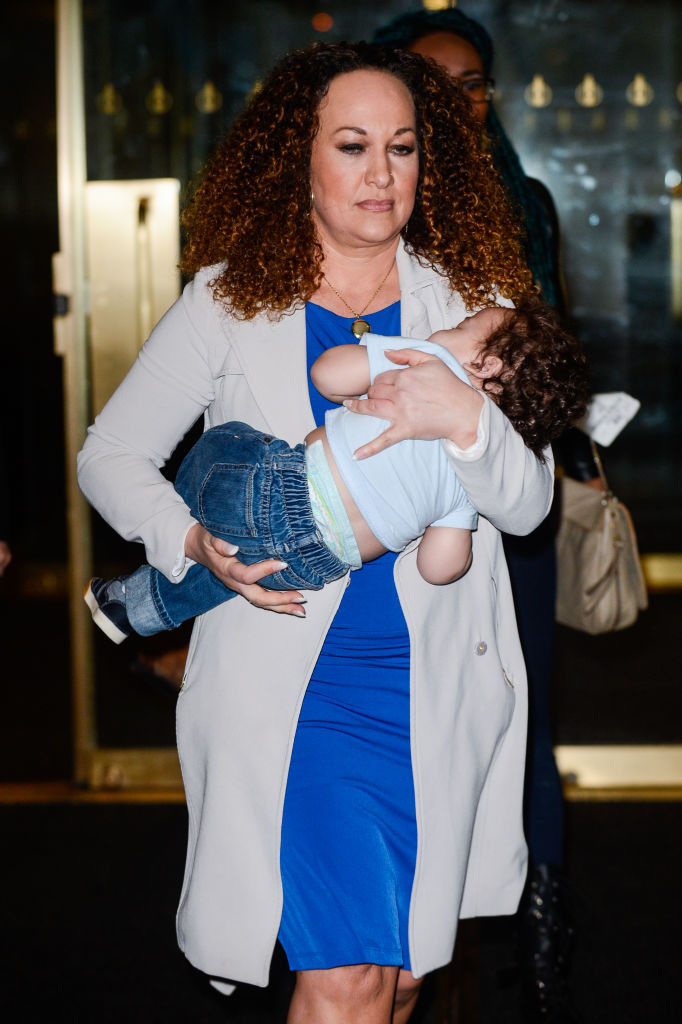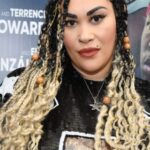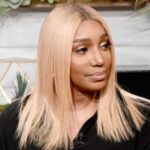
Source: Ray Tamarra / Getty
Sitting in front of a large Africa poster and rocking some really nice braids, Rachel Dolezal recently took some time to chat about the hardships that have taken over her life since the controversy surrounding her race, and how she chose to identify herself, stormed the world almost six years ago in 2015.
If you recall, things got really complicated when people began questioning Dolezal’s status and level of influence within the Black community she considered herself to be a part of. Then working as a professor of Africana Studies at Eastern Washington University, in addition to being the president of the NAACP chapter where she lived in Spokane, Washington, in 2015 a photo of Dolezal was released that showed her in her youth as a blonde-haired, blue-eyed white girl. It was a very different image from the light-skinned Black woman Dolezal was claiming to be. In the aftermath of being caught up and exposed, she quickly became the poster child for any culture-vulture, cultural appropriator, or any person repping a race and/or culture that wasn’t their own.
Still living under that intense and targeted spotlight, Dolezal spoke on the Tamron Hall Show yesterday (Feb. 8) about what life has been like since she was exposed. From what it sounds like, she still feels as though her experience has gone misunderstood by most, but despite that, she still chooses to identify with blackness, even at the cost of being able to secure a job.
“What I really wish is [that] people could see me more for ‘who’ I am [rather] than the ‘what,’” Dolezal told Hall yesterday. “A mother, an activist, and an artist, that’s really who I am. When it comes to race and identity, I’ve always identified racially as ‘human’ but have found more of a home in Black culture and the Black community and that hasn’t changed.”
“I mean I’m still the same person I was in May of 2015,” she continued. “I’m still doing the work, I’m still pressing forward, but it has been really tough for sure. Not having a job for six years, having to create my own job and find my own ways to provide for my children through braiding hair, through grant writing to bring funds into marginalized communities and Black-owned businesses and non-profits, through painting, through doing pep talks on Cameo.com, so it’s definitely been a long six years but I really strongly believe that as a person you have to just continue to be who you are and you can’t change you who you are.”
Just as Hall did, I was looking really confused as Dolezal spoke. Don’t get me wrong, I do think it’s unfortunate and wrong that she hasn’t been able to secure a steady single source of income within the past six years. Still, based on what she said, it’s clear that Dolezal’s stance on formerly masquerading around as a Black woman still stands. She literally said she’s “still the same person I was in May 2015,” so if that’s the case, it’s hard to understand why Dolezal would expect the whole world to change and perceive her differently, when she hasn’t changed or seen the situation differently herself.
Later on in the interview, Dolezal detailed her job search process further. According to her, the “negativity” surrounding who she is and how she identifies has even stopped her from getting jobs that don’t require a degree. For the record, Dolezal has two, including a Master of Fine Arts from Howard University.
“I started with applying for all of the things I was qualified for and after interviews and getting turned down, I even applied to jobs that didn’t even require degrees,” the former professor said. Giving examples of some of the jobs she applied for she added, “Being a maid at a hotel, working at a casino — I wasn’t able to get any of those jobs either.”
As Hall pointed out, it’s not as if Dolezal can’t change the way she’s handled the situation. People change who they are, grow, mature, and practice self-reflection all time and every day. Pressing Dolezal to address this further, Hall questioned her on whether “changing” was the thing at the heart of her self-proclaimed transracial identity story to begin with.
“I think it’s more of a story — for anyone who reads my book, you can really see — it’s a whole life and it’s more of a story of becoming, than changing,” Dolezal said in an effort to correct Hall on her personal experience. “It’s more of a story of finding a home culturally and it’s not one of somehow pretending, or faking, or changing, it’s just becoming. If I had changed, there would be this you know, flip-flopping or somehow scrapping everything under pressure, but this is really just who I am. I really believe that if I’m going to continue to live, I have to continue to be who I am in the midst of pressure.”
What I don’t understand is, why in Michelle Obama’s great God-given earth did Dolezal chose to use the word “becoming?” Even though the complexities of how and why she self-identifies as transracial can be argued, and already have been for that matter, the reality is, no matter how she tries to spin it, being Black isn’t something you “become.” Whether she can see it or not, Dolezal did “change” herself and continues to change herself to live under the guise of a Black woman.
To me, it seems quite understandable why she hasn’t been able to get another job in the academic field. Considering her level of education both as a teacher and as a student, in addition to her work within the community, Dolezal clearly is a highly educated and experienced person. That being said, her interview with Hall shows that during all these years, she hasn’t really absorbed any of the information thrown her way on how her posing as a Black woman not only took opportunities away from real Black women, but also paved the way for other white women who have followed in her damaging footsteps to get their own 15 minutes in our societal discourse. Just last year, a white female student at the University of Wisconsin-Madison campus “revealed she profited academically, financially and socially after posing as a Black woman.” Relatedly, in 2017, a South African white DJ named Anita Ronge began calling herself Kasi Mlungu, and boldly identified herself as Black, basically because she felt like it.
All of it just makes me wonder when Dolezal will begin to hold herself accountable to the reality that her actions have had consequences. Her not being able to find work is the consequence of her own actions, not because people randomly just don’t want to hire her.
When all is said and done, many still don’t find Dolezal trustworthy because of the actions of her own merit. While it’s messed up she hasn’t been able to land a job, that is the consequence of her identifying with Black as a woman before getting exposed. To be honest, it’s also the consequence Dolezal clearly needs to address within herself, especially before continuing to blame other people for holding her to her past and not giving her a job.


